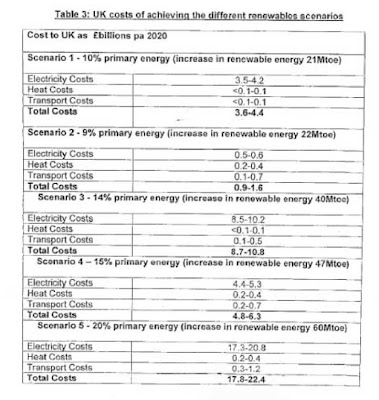
It's part of the dismal Blair legacy, the part where he spent his last few months jetting off to Europe and agreeing to everything they asked for- the Constitution, the abolition of the UK budget rebate (official cost £1bn, real cost more like £20bn), and this 2020 target for 20% of energy usage to come from renewables.
Reading the paper (here) the first thing you realise is that it's even less well baked than the EU's Emissions Trading Scheme (ETS). We estimated that costs British taxpaying consumers about £1bn pa, largely to the benefit of the big energy companies (see this blog).
But this new policy is something else again. To start with, nobody has a clue how it fits with the existing ETS. The paper says:
"The renewables target and energy efficiency measures risk making the existing EU ETS redundant, and prices prone to collapse. Given that the ETS is the EU's main existing vehicle for delivering least cost reductions in greenhouse gases, and the basis on which the EU seeks to build a global carbon market, this is a major risk."
We might say that to impose one half-baked eco cost burden may be regarded as a misfortune; to impose two looks like sheer blithering incompetence. Especially when the second directly undermines the first.
The new approach will also cost much much more than even the ETS. That's because, although ETS was implemented in an extraordinarily cack-handed manner, in essence it harnesses a market mechanism to seek out the cheapest and most efficient ways of reducing emissions, be that renewables or something else.
Specifying a fixed quantified target for the proportion of energy use that must come from renewables means the Commissars not only want to set the target for reducing emissions, but also specify how that reduction must be achieved. Despite all the evidence to the contrary, they still reckon they know better than the market how to get stuff done. It is a return to traditional EU Stalinist planning. The paper says:
"The costs of increasing renewable energy technology... is around three times higher than allowing flexibility in reduction options through emissions trading."
The paper models five possible cost scenarios, based on different ways in which the overall 20% EU target could get divied up between member states. For future reference here's the key table:
 As we can see, in the event that we are forced to accept the full 20% target (and given the way our negotiators roll over, who'd want to bet against that), the estimated costs to us taxpaying consumers are put at about £20bn pa. That's a jaw-dropping £800 per household per year, or 6p on the standard rate of income tax.
As we can see, in the event that we are forced to accept the full 20% target (and given the way our negotiators roll over, who'd want to bet against that), the estimated costs to us taxpaying consumers are put at about £20bn pa. That's a jaw-dropping £800 per household per year, or 6p on the standard rate of income tax.
But our guess is that the real costs will be even higher than that. As the paper acknowledges, its cost projections assume a very high availability of biomass technologies- way beyond anything we currently have, and way beyond anything Whitehall's own studies have previously envisaged as being realistic. It's akin to assuming we can somehow invent a perpetual motion machine. The paper warns:
There are also big uncertainties about the cost of using biofuels in transport."If less biomass is available and other heat technologies need to be deployed, costs would rise rapidly."
So what shall we say?
Double the £20bn estimate?
Treble?
The truth is nobody has the foggiest idea. Our rulers have entered into yet another half baked, open ended commitment they haven't a clue how to deliver.
The only thing we can really be sure about is that we're committed to paying a huge amount of money for technology that doesn't really exist and may not be the best way forward in pursuit of a dragon that may yet turn out to be largely a statistical artefact.